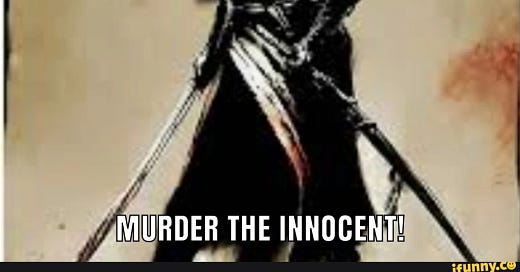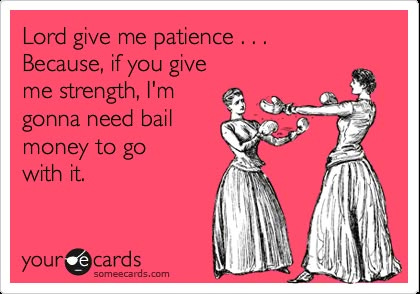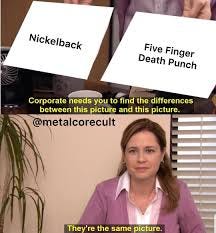I recently talked again about the Eight Mental Aims that James Juarez brought into our branch of Kajukenbo. They’re a sort of bushido that informs our training but has a huge side effect on our everyday lives, too.
Now, when I say “bushido”, a word that people consider the Japanese equivalent to European “chivalry”, there’s something you need to remember: bushido and chivalry will not win you a physical confrontation and they may actually put you at risk. Bushido and chivalry both came about in times of peace. I talk about that in my book, here, but to put it simply, before Japan’s prefectures achieved unity under Tokugawa Ieyasu (portrayed as “Torinaga Yoshii” in the TV show/movie/novel “Shogun”), samurai warriors fought dirty and were sometimes ethically terrible people too.
In times of war, bushido and chivalry will get you killed. Chivalry and bushido were the beautification of the war arts because, frankly, the war champions had nothing better to do with themselves when the country was rebuilding itself. Does that mean bushido and chivalry are a waste of time? I talk about that in my book too, so go check it out.
Anyway, let’s look at the first of our Eight Mental Aims. How does it impact your training, and how does it effect you outside the dojo?
On Patience
We’ll start with the fighting aspect, because if you can’t accept that everything we do comes down to the study of violence (proactively and defensively) you’re wasting your time in the martial arts. Also, fans of Five Finger Death Pouch have a REALLY short attention span. I’ll get to the deeper side later.
On the surface, patience seems like a waste of time for serious fighters. Fortune favors the bold and a passive fighter will get destroyed faster than the kālua pig at a Kajukenbo meet. Preemptive strikes are allowed in self defense (as discussed here in my interview with GM Lynn Case), and solve a problem before it gets serious.
The problem is what comes next. Teaching a student to be passive and then suddenly explode is much more difficult than teaching a student to be violent and then reign it all in. It’s the application of patience that matters, rather than being naturally patient, a trait shared by people who grow up walking on egg shells because they’re traumatically afraid to rock the boat.
That was me, by the way, growing up afraid to rock the boat. I was told I was a polite kid when in actuality I was just too afraid to speak up.
Still, the virtues of patience in an mma match are limited. I suppose waiting for someone to gas out requires patience. Ignoring pre-match trash talk and keeping a cool head requires patience. Dealing with nerves before a fight requires patience. But in the actual chaos of unchoreographed violence, where every split second counts and action is faster than reaction, patience will not be your priority.
Physically, the benefits of patience truly start to shine in self defense.
That preemptive strike I mentioned only works if you don’t lash out too early. Tim Tackett’s Verbal Jiu-jutsu, which I’ve mentioned multiple times, requires patience when someone really pisses you off. Whether your self defense goal is survival without fighting or an ambush of your own to take someone out, you can achieve both after talking the guy down - but that requires patience.
And sometimes achieving your goal of survival means taking a deep breath and walking away. When a teenager asks you if the Led Zeppelin song you’re listening to is Nickelback, patience will keep you from getting arrested. (That right. I’m STILL making fun of Nickelback.)
The question is: What can patience do for you outside the dojo?
“Death is Nature’s Way of Saying ‘Slow Down’.”
The Kajukenbo motto: “Through this fist art, one gains long life and happiness.” The real benefit of any bushido/chivalry code in the modern day is the mental health it bestows. And one early lesson some students get in the dojo comes from this question/answer session:
“Sensei, how long does it take to get promoted to the second belt?”
“About 6 months, plus two years for every time you ask that question.”
In a world of deadlines and certifications, the idea that there is no set date for when you will get promoted is pretty alien to the secular mind. As new-agey as the idea of “don’t focus on the belt” sounds, it goes pretty well with the idea of working on Hawaiian time. You’ll get there when you get there.
For those wondering why I don’t start a dojo-business of my own, it stems from my hate of McDojos. Yes, you can run a legit martial art business and not be a McDojo, and maybe someday I’ll have the capital to lease a building or have one given to me to use, and I’ll make enough money without selling out the art and my instructors’ teaching methods, but for now I love teaching for free.
Anyway, McDojos. One reason I hate them is that you’re promised rank advancement in a set time at a set price, with a minimum level of effort. The idea is so sickeningly prevalent in the world of martial arts business that it often pushes great fighters away from the traditional arts. That’s why I also loved finding a dojo where it takes 8-12 years to get a black belt, on average. That’s not a set number - people just learn differently, and we have a lot to learn.
That’s a good thing.
The patience required to reach breakthrough in your training isn’t a concerted effort. Patience is letting go of what’s dragging you down so you can smell the roses without stressing.
The real benefit of learning patience, something we try to teach in the martial arts, is learning to focus on what’s important and letting life go at its own pace. You can’t rush perfection, you can’t rush growth.
So don’t rush your training. Smell the roses and let life go as it will.
Stay tuned for more writing on the other Mental Aims of Gaylord Method Kajukenbo.








